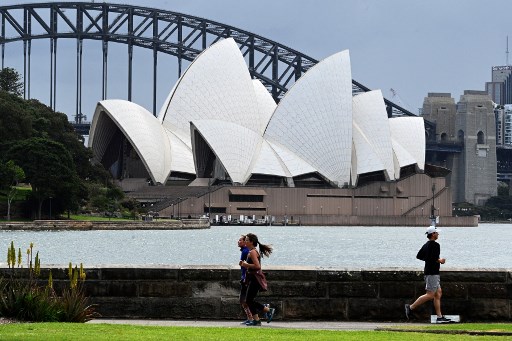
SYDNEY, Australia (AFP) — Sydney authorities moved to lift curfews for coronavirus hotpots Wednesday, as infection numbers stabilised and vaccination rates surged.
Almost three months after activity in Australia’s largest city was frozen by lockdown orders, state authorities announced easing restrictions for the worst-hit areas.
New South Wales Premier Gladys Berejiklian said the 9 pm to 5 am curfew for virus hotspots would be lifted from Wednesday, in what Sydneysiders hope signals the beginning of the end of a long lockdown.
Infection rates appear to have plateaued at around 1,300 a day and 80 percent of people in Australia’s most populous state have received at least one vaccine dose.
“We’ve seen a stabilization in the last few days,” said state premier Berejiklian, while urging residents to continue to be vigilant and respect stay-at-home orders.
“We don’t want to see that trend go the wrong way.”
Most Sydney residents can only leave home to buy food, exercise outdoors or seek medical treatment.
Schools, bars, restaurants and offices have been closed since late June and residents are not allowed more than five kilometers (three miles) from their homes.
Berejiklian has said many restrictions will lift when 70 percent of residents are fully vaccinated, sometime in October.
“We know it’s been a struggle but there are only a few weeks left before we get to 70 percent double dose,” she said.
An 18-month-old ban on Australians leaving the country is set to expire in mid-December, raising the prospect that international travel could also resume.
Researchers at the Burnet Institute said this week that it appears that restrictions on hotspots introduced in late August have “worked to halt the rise in cases”.
But they warned restrictions would still be needed to stem outbreaks.
Authorities have said reopening will only apply to those who are fully vaccinated.
“It’s black and white. If you’re not vaccinated, you can’t go to a restaurant. You can’t go to a cafe,” Berejiklian said.
During much of the pandemic, Australia saw some of the world’s lowest infection rates as it pursued a policy of “zero Covid” — suppressing the spread of the virus with aggressive contact tracing, testing and quarantine.
The fast-spreading Delta variant forced that strategy to be abandoned in favor of stepping up once-glacial vaccination rates.
Berejiklian warned that with 20 percent of people still completely unvaccinated, hospitalizations and deaths are likely to spike even as Sydney reopens.
“The next couple of months will be the most pleasing in terms of getting out of the lockdown but also the most challenging,” she said.
“We will have to balance every day, the risks between putting pressure on the hospital system, but also allowing people to live freely and allowing businesses to start up again.”
© Agence France-Presse







